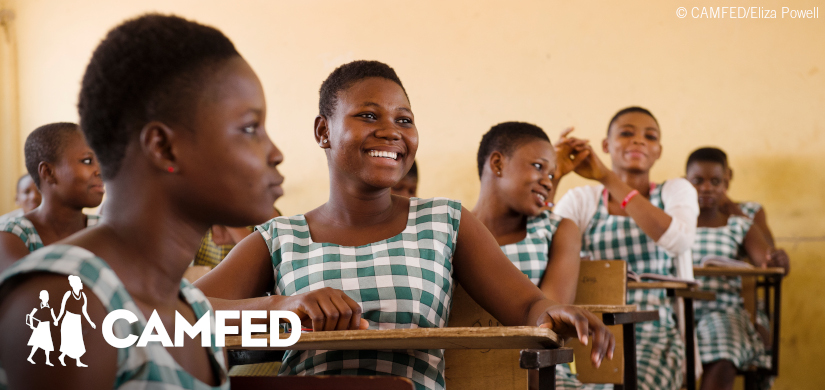You are in:
- Area of Communication and Media |
- Other News
Start of main content
Princess of Asturias Awards 06/16/2021
CAMFED, Campaign for Female Education, Princess of Asturias Award for International Cooperation
CAMFED, Campaign for Female Education, has been granted the 2021 Princess of Asturias Award for International Cooperation, as announced today by the Jury responsible for conferring said Award

©FPA
CAMFED, Campaign for Female Education, has been granted the 2021 Princess of Asturias Award for International Cooperation, as announced today by the Jury responsible for conferring said Award.
The Jury for this Award –convened by the Princess of Asturias Foundation– was chaired by Gustavo Suárez Pertierra and composed of Pedro Alonso Fernández, Maite Arango García-Urtiaga, Eugenia Bieto Caubet, Francisco de Paula Bisbal Pons, Andrés Conde Solé, Miguel Delibes de Castro, Beatriz Domínguez-Gil González, Enrique Fernández-Miranda y Lozana, Duke of Fernández-Miranda, Luis García Montero, Cristina Garmendia Mendizábal, Daniel López Acuña, Íñigo J. Losada Rodríguez, Sophie Müller, Sami Naïr, Juan Carlos del Olmo Castillejos, Ana Pastor Julián, Luis Sánchez-Merlo Ruiz and Gloria Fernández-Lomana García (as acting secretary).
This candidature was put forward by Julia Gillard, Former Prime Minister of Australia. It was seconded, among others, by Baroness Martha Lane Fox, Chancellor of the Open University (United Kingdom).
Due to the situation resulting from the COVID-19 pandemic, the meeting was held online via video conference.
Founded in 1993 by Ann Cotton, CAMFED - the Campaign for Female Education - is a pan-African movement which invests in girls’ education, led by a sisterhood of young women with first-hand experience of the barriers to girls’ inclusion. Through collective, grassroots action, CAMFED has already supported more than 4.8 million children to go to school across Ghana, Malawi, Tanzania, Zambia, and Zimbabwe, and millions more students have benefited from an improved educational environment across more than 6,700 partner schools.
CAMFED promotes systemic change aimed at addressing the exclusion of girls and women from the opportunities offered by education. It does so through the leadership of the CAMFED Association (CAMA) –an organization created in 1998 by the first 400 beneficiaries of the Campaign for Female Education— in partnership with rural communities, employing four different approaches: equity and social justice (education as a fundamental human right that should not be denied to girls and women), economic development (reinvestment in disadvantaged communities), young women’s leadership (changing socio-cultural norms, protection and empowerment of marginalized girls), and action against climate change (transition towards climate-friendly practices and reduction of future carbon emissions).
However, the main characteristic that makes CAMFED stand out from other organizations of the same type is the implementation of a model that not only provides marginalized girls access to education, but also supports them in the transition to adult life and fosters new business opportunities for job creation and income growth in rural areas. Thanks to its network of more than 178, 000 leaders educated with CAMFED support, the number of CAMFED beneficiaries continues to grow, as each past recipient of a scholarship mentors and financially supports an average of three more girls to stay in school. In his article “Choose a Gift That Changes Lives”, New York Times columnist Nicholas Kristof described this dynamic as “a perpetual motion machine... a virtuous cycle that grows over time”.
CAMFED’s programs, led by CAMFED Association members, include the Learner Guide Program and the Transition Guide Program, whose goals are to deliver life and learning skills in school, and support graduates into independent livelihoods beyond school, including in climate-smart agriculture. Thus young women farmers are helping to provide nutritious school meals, protect biodiversity and incorporate Indigenous and innovative technologies to reduce pollution. CAMFED has recently declared its commitment to provide primary and secondary education to another five million girls, enable a safe path to vocational training and employment for 280,000 women, and support female entrepreneurs in the creation of another 150,000 jobs by the years 2021-2025.
Awarded the Yidan Prize for Education Development (2020), the Nicholas Kristof Holiday Impact Prize (2020), and OECD Recognition for Taking Development Innovation to Scale (2014), among other recognitions, CAMFED’s approach to supporting young women climate leaders was distinguished with the 2019 United Nations Global Climate Action Award at COP25 in Madrid (Spain).
This year, a total of 29 candidatures comprising 16 nationalities were put forward for the International Cooperation Award.
This has been the sixth of the eight Princess of Asturias Awards to be bestowed in what is now their forty-first edition. Previously, the Princess of Asturias Award for the Arts was granted to performance artist Marina Abramović, the Award for Communication and Humanities went to journalist and writer Gloria Steinem, the Award for Social Sciences was conferred on economist Amartya Sen, the Award for Sports went to swimmer Teresa Perales and the Award for Literature was bestowed on writer Emmanuel Carrère. The coming weeks will see the announcement of the following Awards (in this order): Technical and Scientific Research and Concord.
Each Princess of Asturias Award comprises a Joan Miró sculpture symbolizing the Award, a diploma, an insignia and a cash prize of €50 000.
End of main content
Sección de utilidades
Fin de la sección de utilidades
- Legal document Legal document (Access key 8)
- | Privacy policy Privacy policy (Access key )
- | Social networks ???en.portal.pie.menu107.title???
- | Cookies ???en.portal.pie.menu110.title???
- | Site map Site Map (Access key 3)
- | Contact Contact (Access key )
- | XHTML 1.0
- | CSS 2.1
- | WAI 'AA
© Copyright 2024. FUNDACIÓN PRINCESA DE ASTURIAS



